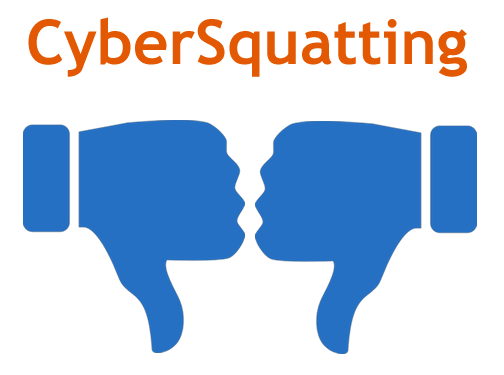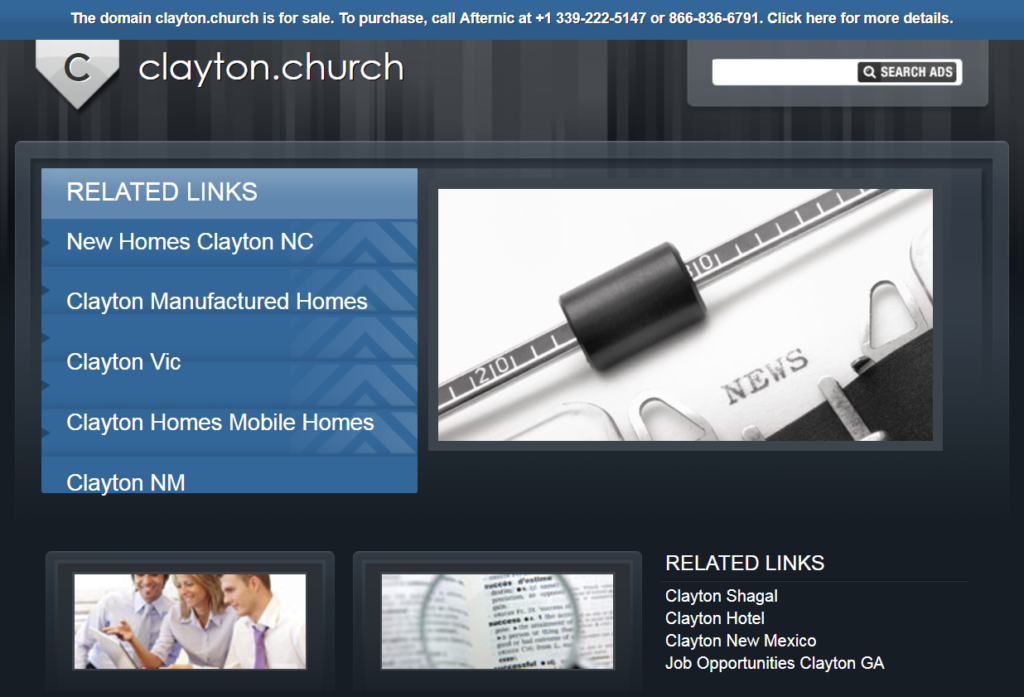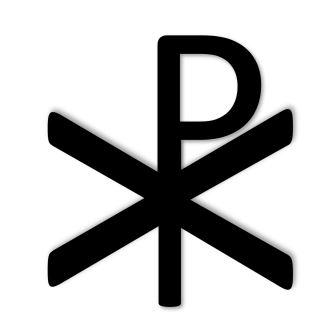
Cyber squatting is the practice of registering, selling or using a domain name with the intent of profiting from the goodwill of someone else’s trademark. It generally refers to the practice of buying website domains that use the names of existing businesses with the intent to sell the names for a profit to those businesses.
I recently came face-to-face with an instance of cybersquatting, and not for XBOP fortunately (although I have not checked… but realistically, XBOP does not need any other domains) I thought I would check out http://www.clayton.church/ for fun since if it was not yet taken by another church, I would register it for Clayton Church. Of course, the domain had been registered and was in use:
 The top banner gave me hope – perhaps the purchase price would not that much – such was my naive thinking… The top banner led me to a contact form, which I completed and led to a call-back from a number registered in Sydney. Some guy from Afternic called be to say that he was acting on behalf of the owner in offering the premium domain for sale at $5888 USD! “Fortunately” both he and the owner was used to dealing with these trades and he would check to see how negotiable the owner was, suggesting that a discount of 5~10% may be possible… As the conversation reached that point, it was good timing that my train commute into work was entering the Melbourne City Loop, and I requested a call back in 10~15 minutes. I decided to use the gap in our conversation to do more extensive research.
The top banner gave me hope – perhaps the purchase price would not that much – such was my naive thinking… The top banner led me to a contact form, which I completed and led to a call-back from a number registered in Sydney. Some guy from Afternic called be to say that he was acting on behalf of the owner in offering the premium domain for sale at $5888 USD! “Fortunately” both he and the owner was used to dealing with these trades and he would check to see how negotiable the owner was, suggesting that a discount of 5~10% may be possible… As the conversation reached that point, it was good timing that my train commute into work was entering the Melbourne City Loop, and I requested a call back in 10~15 minutes. I decided to use the gap in our conversation to do more extensive research.
I found the definition of cyber-squatting at the start of this article was sourced from Nolo, along with a whole set of information on the situation. Cyber-squatting can take various forms, and the type encountered in our scenario is a case of exploitation. As I highlighted/emphasised in definition, part of the trick in identifying cyber-squatting is to examine the intent of owning a domain – is it a legitimate business or just a placeholder to make a profit. The sheer fact that the screen-shot has the “For Sale” banner is proof to me that the current owner has intentionally registered the domain for the purpose of extracting payment from legitimate sources like my church. ICANN, as the international authority of this topic has a clear policy on cyber-squatting. Legitimate businesses can strengthen their case by ensuring their brand is trademarked.
Now it’s bad enough that cyber-squatting targets for-profit businesses, and whilst I personally do not agree with the business model, I do take issue with the targeting and exploitation of not-for-profits, who have to prioritise their budgets. I believe the majority of churches and not-for-profit organisations will adopt two approaches:
- Similar situation to Clayton Church, we already own our primary domain of claytonchurch.org.au. My efforts are an additional bonus attempt to protect our brand. I am not spending church financial resources on this effort. Organisations may choose to ignore and just let the status quo remain.
- Where an organisation wants the affected domain to be a key representation of their brand, the willingness to engage and in the worst case, cough up the payment amount demanded increases. In some cases, organisations will be able to pay the amount demanded. Larger for-profit businesses will consider the $5000+ USD amount to be acceptable – but I make the case that for churches in particular, the finances should be used for better social outcomes and impacts.
Digging further into my case of clayton.church, GoDaddy/WHOIS provided the following public info on the currently registered domains.
Registry Expiry Date: 2017-10-14 T15:39:54Z
Domain Status: clientDeleteProhibited https://icann.org/epp#clientDeleteProhibited
Domain Status: clientRenewProhibited https://icann.org/epp#clientRenewProhibited
Domain Status: clientTransferProhibited https://icann.org/epp#clientTransferProhibited
Domain Status: clientUpdateProhibited https://icann.org/epp#clientUpdateProhibited
Registrant Name: Eliahu Eweka
Registrant Street: 10193 E. Exposition Avenue
Registrant City: Denver
Registrant State/Province: Colorado
Registrant Postal Code: 80247
Registrant Country: US
Registrant Phone: +1.7204294139
Registrant Email: elieeweka@yahoo.com
According to this information, the domain expires in a few months time (14 October 2017) which is after a 1-year period. Further, the prohibitions against the domain status suggests to me that the current owner cannot renew beyond October!
Afternic, the organisation who contacted me, exists to facilitate this kind of grey-market dealing – the guy who called me claimed that it’s a legitimate business because owner is “investing in digital property”. This is the way businesses like Afternic justify their existence and the grey market they have created. Just because legislation does not currently exist to outlaw this practice does NOT make it ethical or morally correct. Many areas of business exist in this gray space and get away with it. The fact that the Afternic representative even argues that it is an investment shows the intent is to profit off the current domain ownership – which to me, satisfies the criteria of the ICANN policy. Now, ICANN have a dispute resolution process but that costs $1000 USD itself! Perhaps, for-profit businesses can justify spending that kind of money to protect their brand, but what hope do small businesses, let alone not-for-profit organisations?
The second conversation with the Afternic representative rapidly went downhill as I made the points above. His position in justifying his job and the owner’s decision as “investing in digital property” really made me mad. When I cited the ICANN policy and avenue, he laughed at me and rubbished me, saying that ICANN would side with him/Afternic.
Appealing to one’s sense of ethics and morality fell on deaf ears. Making the case that this situation is particularly exploitative induced an interesting reaction – where the Afternic representative cited the $ millions that CEOs of charities are paid as justifying why businesses like Afternic can charge $1000s in domain trading. I closed down that stupid line of reasoning as irrelevant. Yes, there have been questionable practices for large organisations but that is not a reason for a whole industry to exploit small and genuine not-for-profit businesses who have to navigate the challenges of doing business.
I ended the call my stating that if I could not appeal to his or the owner’s sense of morality and ethics, I would at least channel my frustrations into shining a spotlight on these practices and warn people – hence this article. Sure, the world has unethical and morally questionable individuals and organisations. The world is not a level playing field and cyber-squatting is but one area of questionable practice which should rightly be outlawed.
Global top-level domains (gTLDs) remain the most vulnerable to this practice because the providers operate across multiple legal/national domains unlike country-specific top-level domains such as .AU which is administered by the Australia Domain Authority (auDA). In order to own an Australian website domain, owners must prove and justify why they wish to own and operate the domain – typically with an Australian Business Number (ABN).
From a Christian perspective, pray for:
- Protection for genuine businesses/entrepreneurs who may encounter such unethical practices
- Wisdom in genuine businesses/entrepreneurs as they develop their brands – watch out for these wolves who would seek to distort legitimate brand reputations
- Conviction in the hearts of individuals/businesses who help to perpetuate grey-market practices, that they may change their ways and find ethical and moral ways to do business
Lessons/Tips if you are concerned about your brand and cyber-squatting:
- Check/visit the suspect URL/domains to see if a website exists
- Check the suspect URL/domain by performing a WHOIS lookup.
- Contact the domain registrant to negotiate (in some cases the amount requested may be the fastest way to resolve the issue)
- Where the case is cyber-squatting, you can:
- Sue via the US Anticybersquatting Consumer Protection Act (ACPA) [US-based]
- Lodge and pay for dispute resolution via ICANN

You must be logged in to post a comment.